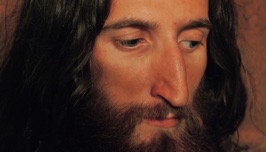Sermons
From God-Masking to The Lord

Conversion 3: From God-masking to The Lord
A sermon by Pastor Noel Anderson at First Presbyterian Church of Upland
TEXT: ROMANS 8: 31-39 CEB
Masks We Hold up to Others
Last week, we talked about the masks we wear and how much better off we are without them. But consider: if we can put masks on ourselves, we can also put masks on others. I noticed this within the first year that I was a pastor. It surprised me. I’d meet somebody, a stranger, and I’d say, “Yes, I’m a Presbyterian minister.” And you’d see them suddenly go from being comfortable to going kind of stiff. I’d try to talk to them down to earth like a normal human being but they’re holding up the “pastor mask” in front of me and they want me to talk to them only through that mask. You know, so don’t be human. Perhaps we’ve all done that; I’m sure I have.
The bigger issue is that we can also do this with God! What is the second commandment? “You shall make no graven images.” And this is “No Idols.” But what is an idol but a mask that human beings construct for God. So the second conversion we undergo as Christians is one from God-masking—putting a mask on God—to letting the Lord be the Lord in His own way. That’s God masking. We’re to become like Christ. Our mission statement is “Growing in Christ, making Him known.” We are growing into Christ—but we Christians can also try to make Christ like us, and that’s idolatry. We can easily prefer to define God according to our own self interests–either individually or culturally–and that’s wrong. We gotta get beyond it.
Our Favorite God masks

In my family we had a favorite picture of Jesus. And it’s this one. According to one pole taken in the late 80s, this was America’s favorite picture of Jesus. My parents both said this was their favorite picture. My older brother’s a pastor and yeah, that’s his favorite picture. And it makes sense because we were all Swedish and it was made by a Swedish artist who was a member of the Covenant Church. So we have Jesus the Swede! The idea that Swedish people made Jesus look quite Swedish may be a textbook case of God-masking.

The Jesus Movement in the 70’s brought all kinds of new life to the church. Everybody was coming back to the Lord. Charismatic movements flourished across denominations and people were again falling in love with God, swooning, tonguing, and singing Maranatha songs. New art featuring Jesus arrived. You see that Jesus? That’s a strong, healthy, strapping, American Jesus, isn’t it?
Speaking of an American Jesus, one of my favorites from my teen years featured Jesus looking like the captain of the Football team.

When I was in junior high it was my favorite picture of Jesus because I thought the one my parents liked (Swedish Jesus above), looked too feminine. I wanted a male–a manly Jesus. So this one very popular in America in the 70s and 80s—Jesus the football captain. Kind of looks like Kevin Costner.

Next: Jesus the hippie. Part of the Jesus movement was not so much about turning Jesus into a hippie as it was to say, “Jesus was a hippie like us.” There’s common ground—long hair, the beard—but this idea of God-masking at its heart is that we re-make Jesus into an image that serves us and our own interests. Radicals say Jesus was a radical, liberals say he was a liberal, conservatives say he was a conservative–all are attempts to put a mask on God to make him more like us and serve our own self-interests. Every one of them is wrong.

The tattoo dude Jesus. I kind of like this one and no, this wasn’t a joke—this was a serious portrait that somebody painted trying to honor Jesus. Gotta love it. The tat says, “Father.”

Next we have the black Jesus, who is actually a very nice looking shepherd. There were activists in the 70s who seriously tried to prove that Jesus was actually Ethiopian and therefore African. With all due respect to the virtues of the movement, I think we have to say that this is no different than the Swedish Jesus.

Next we have the Perfect Dad Jesus. This is Jesus as the perfect Dad—to one you never had. Yeah, I would like to think of Jesus as the perfect dad, helping me with my batting stance.

Next is “Ms. Jesus.” Some feminists have portrayed Jesus as a woman. Some have actually tried to argue that he was female, but that’s kind of a lost cause. But I concede that there’s art to this and it is not entirely without reason. We all want to say that we identify with Jesus. Jesus is meant to identify with every one of us, so why not have a portrayal of Jesus to identify with every aspect of what makes us human?

Next, the “Buddy Christ.” from the movie “Dogma.” This is perhaps the worst, but it is one of most excellent critiques of popular American evangelicalism. The whole idea of taking Christ–who is the Lord Incarnate, God Almighty, worthy of our admiration and worthy of all Glory–and turning him into a buddy? That is blasphemy. I noticed something in the hip churches in the 70s and 80s I visited in Orange County–everyone there very surfer dudish in all their OP wear and flip flops—and it was all: “Yeah, it’s all cool to be Christian. And yeah, Jesus was a cool guy! And if he were here today he’d be out surfing with us.” I got the impression that if Jesus actually appeared they wouldn’t hit the ground and worship him in fear and trembling; they’d slap him on the back and say, “Alright, Dude, let’s catch a wave!” That is a minimization of Christ. That is a Christ that you don’t have to take too seriously.
And this kind of masking gets made in other ways as well. God is revealed as Father—not as mother, not as grandfather, not as buddy. Among all these choices—If I were to pick one mask for God among the many—I think I would choose God as grandmother. Doting, always approving, wonderful, warm all the time—that would be great. I definitely would not choose father. Fathers kick your butt. Really, I mean who isn’t a little afraid of their father at some time in their life? But we don’t get to make these choices. We don’t get to choose which God we’re going to worship, or which God we’re going to serve. But this is exactly what the world does.

Some “scientists” devoted themselves to the task of trying to determine what the historical Jesus may have looked like. They came up with this portrait—which is, of course, insulting to Christians across the board. These “scientists” managed to make him look not only ugly but also utterly befuddled. It turns out, the model for this drawing was both a gangster and prisoner. Now I love gangsters and prisoners! I certainly prefer them to the so-called scientists.

A couple things we do know: Jesus was Jewish. He was Semitic. He wasn’t European. He wasn’t white,. He wasn’t Asian, He wasn’t white-skinned. He was Jewish. So when we Americanize Jesus, we do our faith a disservice. Besides, it is right that we should acknowledge his Semitic human nature and middle-eastern-ness, because in doing so we can’t easily escape the essential other-ness of Christ that we otherwise are so eager to put a self-styled mask upon.

Next a rendition drawn from the Shroud of Turin. The Shroud of Turin was the earliest model artists used to draw the face of Christ. And you can go back as far as the 4th-5th centuries and find that artists from the earliest time, looking at the Shroud of Turin, which was faint then, used it as a model for how they would portray Jesus. We really don’t know what that image on the Shroud looks like.. Every depiction is an artist’s rendering. The European draws it; it looks European. The Indonesian draws it; it looks Indonesian. An African draws it; it looks African. I thank God we don’t know much more—that we don’t have a photograph of Jesus—because if we did, people would worship it rather than the one to whom it points.

There was a picture of Jesus in the bedroom I shared with my big brother. He put it up and it became my favorite.although it’s not particularly pleasant. In this picture you can’t quite sure whether Jesus’ eyes are open or closed. It is Jesus on the cross being crucified. Over the years this stuck with me because while it isn’t pleasant to look at, it offers a kind of challenge to the viewer. Are his eyes open or are they closed? The way my brother explained it to me—the eyes of faith see the eyes open—He is Risen, but eyes without faith would say his eyes are closed because he is not risen. Is Jesus dead or is He alive? I also liked it just because it wasn’t particularly pleasant. It reminded me that Jesus wasn’t a buddy but he suffered for us—a man of sorrows, acquainted with grief.
Mask Issues: We Got ‘em
We all have mask issues. We all have the temptation to think about God in a way that pleases us or serves us. This is true of every people and group in the world. We have to beware. People who don’t have faith—and they’re very vocal today— see a different God. They see an angry, Old Testament God. The angry, Old Testament God of wrath. The God who is angry over your sins. Isn’t that God of the Old Testament? I would say no. What we read of is at at least a partial mask drawn by the ancient Jewish people, whose personal interests and ancient worldview affected their propensity to make masks for God as well. Did they know God completely? No they had a limited understanding of God and a limited revelation of God. What they got right was how contemptible to God their own sinfulness was.
But we live in a different world. We live under a new covenant—one that proclaims to us that the angry, Old Testament God is not in fact God’s true nature. That is not what God is like.
We have to let God be God on his own terms. This is hard work. We must say we are not content with any mask that we might make. You may rightly ask, “But how can we know God as He is?” I’m going to suggest the way. First of all, we must let God tell us.
1. God must self-reveal.
God must self-reveal. This is the most serious point. This is what divides us—Christianity—from every other world religion and all of paganism, that we are not allowed to construct God or anything about God. This is the hardest work of theology—this scraping off the barnacles that we create along the way. We easily say things about God that we’d like to think. Anytime you begin a phrase, “You know I’d like to think of God as…” I say, beware whatever follows. We’d all like to think of God as something, but we don’t get to create God. God is not a construction of the human imagination. God either speaks for Himself or else the language is unreliable, idolatrous. This is what separated Abraham from everyone else in the world: he didn’t go looking for God, God went looking for him. And this is the biblical narrative throughout. The people wanted to set up a golden calf, but no, you mustn’t put a mask on God. God speaks for Himself. All Christian theology is based in revelation—in God’s self-revelation.
2. We must resist our own inventions.
The second point is that we must be resist our own inventions. This is hard! As we live with God and live to please God, the Church in all her forms has made up things about God in order to function ,pre efficiently, effectively, or influentially. “God wants to lift the cup this way instead of this way. God wants us to do this, God wants us to do that.” Much of this is our attempt to mask God. And whenever we put up any kind of a mask for God, whenever we make Him something w want Him to be, we lose in the relationship. We don’t gain. We only gain by allowing God to speak for Himself and refusing to have anything in our own hands or under our own control.
3. God’s Word is His self-revelation.
Thirdly, God’s word is His self-revelation. God speaks for Himself, and His own words about Himself are sufficient.
So we ask, How are we to know what God says? Ultimately, God is known through Christ. It is just that simple.
4. Jesus Christ is the Word of God.
Jesus is the Word of God. A popular American rhetorical device calls the Bible is “the Word of God.” With great care, I’m going to say that isn’t perfectly true. God’s word is in Scripture. We experience God through the words written on the pages of the Bible. But nowhere does the Bible claim itself to be the Word of God.
We call it the Word of God written. What does the Bible say about the Word of God? John 1: In the beginning was the Word, the Word was with God, the Word was God. And through the Word all things were created. The Bible makes it clear that the Word of God is Jesus Christ. Jesus is God’s Word made flesh. Jesus is the Word. The Bible is our access to Christ. It is the unique and authoritative witness to the Word of God: Jesus Christ.
Now because we have big hearts and because we love Jesus, we look at the Bible and say I’m opening the word of God. In the same way, this is really just the container. Or this is the window. If I’ve got a big pot of coffee here and I offer you “a cup,” I’d say “Would you like a cup?” And you say, “Yeah I’d like a cup!” But if I just give you an empty cup, you’d go be disappointed (By the way, I’d never do that to you!). What you wanted is not the cup itself, but that wonderful black, hot liquid that is contained by the cup. You don’t want a cup, you want the thing inside the cup. In the same way: Do you want the Bible? No, I want the one whom the Bible proclaims and to whom the Bible makes its unerring, constant witness. We believe not in the Bible, we believe in the One to whom the Bible makes its witness. Jesus Christ is the Word of God, primarily and finally.
5. God is Known through Christ.
Fifth, God is known through Christ. This is good news because it means we can know God as he is. God is not un-knowable. God has been revealed decisively, completely, sufficiently, in the person of Christ. When we see Jesus we are seeing the Lord God. Those who have the Son, have the Father. Jesus is the face–the true face of God–to us. All of our renderings, paintings, and pictures are all wishful thinking, mostly painted to make us feel better about ourselves.
We Still Love the Masks
I got in trouble in 8th grade in the Covenant Church in Omaha, Nebraska, because in the church library there was a huge portrait of Jesus. And it wasn’t the Swedish one you saw, it was another Swedish one, where Jesus had long, flowing blonde hair and bright, blue eyes, looking as Swedish as lutefisk. And I, in 8th grade, said to a number of women in there having their tea: “That doesn’t look like Jesus!” They said, “What do you mean, what’s wrong with it?” I said, “Jesus was Jewish. He would have looked Jewish.” And they said, “You should just keep your opinions to yourself.”
I have until today.

We know God through Scripture. It is through the Bible, Old Testament and New, that we get the full picture of who Jesus is. Some teenager made this painting I love—Jesus breathing through Scripture—from behind the Scripture. Revealed through the Scripture. How do we come to know Jesus? How do we come to know who God is? How do we come to know God? Just like this. Like: Jesus loves me, this I know, for the Bible tells me so. Little ones to Him belong, they are weak but He is strong.
As our text says, we are His children. I want to close with this verse again from Romans 8, which is the good news:
For I am convinced that neither death, nor life, nor angels, nor principalities, nor things present, nor things to come, nor powers, nor height, nor depth, nor any other created thing will be able to separate us from the love of God that is in Christ Jesus, our Lord.
This is the Word of the Lord. †
From Masks to Real

Conversion 2: From Masks to Real
A sermon by Pastor Noel Anderson at First Presbyterian Church of Upland
There are many conversions of the Christian life, not just one. In this series we’re talking about seven. How many are there? Maybe a hundred, but they are the ways in which we are changed inwardly that affect our outward lives as well. There are, many changes that characterize the mature Christian walk. Our book, The Cure, is our guideline narrative through these passages. First, I want to give you a little theology up front.
Adam and Eve, when they had the chance for obedience, broke. When they took the fruit something happened to them that characterizes all of us. When they ate they became aware of nakedness. I think this is spiritual shame. They knew shame. and what did they do? They hid themselves from God and they took some fig leaves and covered themselves up. This is the nature of all of our “masking.” The masks we would wear—any masks that we wear—are just another form of fig leaves. We cover our shame for many different reasons. God, in His love, still accepts Adam and Eve, and still sought to redeem them. We’re going to talk about those masks today and the conversion of going from wearing masks to being real.
So, our text is Ephesians 1: 3 through 6.
3 Bless the God and Father of our Lord Jesus Christ! He has blessed us in Christ with every spiritual blessing that comes from heaven. 4 God chose us in Christ to be holy and blameless in God’s presence before the creation of the world. 5 God destined us to be his adopted children through Jesus Christ because of his love. This was according to his goodwill and plan 6 and to honor his glorious grace that he has given to us freely through the Son whom he loves. †
We are the Children of God
This text I’ve just read stands at the heart of what it means to be a Presbyterian and Calvinist. The original language says “predestined us before time,” and that has created all kinds of very pointless, stupid arguments for hundreds of years. Our predestination – our being “destined”—has to do with God’s love for Christ. The Father loves the Son from time-before-there-was-time—infinitely, eternally past and eternally future. Because God loves Christ, we are loved, because we are in Christ.
We are like adopted children. We are like the ones who Jesus brings home to the Father and says, “Dad, can I keep them?” And God says yes. Our position is not earned; it has nothing to do with who we are in and of ourselves, but entirely has to do with God’s love for Christ and our election in Christ. God elects Jesus to salvation, and all those whom he brings with Him.
It was a little more than a year ago. My wife was in the office and it was a Friday, so I wasn’t in the office—I take Fridays off. I texted Tara and wanted her to bring a book home and she texted back to me, “That’s not all I’m bringing home.” I thought, “Oh no, what’s happening?” Then she texted me a picture. Apparently a little puppy had wandered into the Preschool. Somebody had either dropped it off or it had come over from the apartments. So she sends me a picture of this dog on the chair in her office, and I’m thinking, “Oh, No! We already have a dog!” Little Zoey. And this little dog came home and immediately we sent out all the ads, notifications, etc.. After about 24 hours I said, “I’m going to go take all the signs down.” We called the pound and I said, “That dog is mine whether or not anybody comes to claim her.” We waited the appropriate 30 days, but by one week I knew it didn’t matter. If the “owners” didn’t come the first day, they’re not worthy of her!
Zoey is one of the loves of my life. She is nearly perfect in every way. I should tell you she sleeps – no joke—cheek-to-cheek. I mean it’s just the cutest dang thing. This dog is so loving—and it favors me instead of Tara! Every animal I’ve ever had—every animal I’ve ever known—favors Tara. Tara’s one of those people with a sixth sense thing with animals. Cattle will come up to her and lick her arm. She is just one of those rare amazing people who connects remarkably with animals. But Zoey likes me! And is little Zoey perfect? I say yes. Has she experimented with bathrooms in different rooms of the house? Yes. Has she pooped on the bed? At least once, by which I mean a dozen times. Do I hate her for it? Do I abandon her? Do I say, “You are unworthy of my love, little puppy?” What kind of crazy person would do that?
What kind of God would do that? Zoey is adopted in to our family as a full-fledged member and child, and man oh man, I love that dog so much! I know a lot of you have dogs or cats—you realize this lesson of what it means to be loved and what it means to love them. The lengths you feel you would go to for who or what you love—your pets, your children, your grandchildren.
God’s love for us is infinitely greater—more passionate and deeper than we can imagine. As much as I love this stupid little dog, I know that God loves me more and I know that God loves you more than that. And we don’t get it. It is proclaimed to us: we are the adopted children of the Father through Christ. Christ says of us, “Can I keep them?” and the Father says, “Yes.” Jesus might add, “but they’re a little bit problematic.” And the Father says, “It doesn’t matter. I love you and I love those whom you love.” And that is who we are. Who we are, brothers and sisters, is whose we are. And who has said, “Can I keep you?” Yes, we belong to Jesus. We are who he says we are, and all our thoughts about ourselves can’t compare and ought not to compare. This is the good news, that Jesus loves sinners and he delights in you. He delights in me. We are his sons and daughters through Jesus.
So Why do we Wear Masks?
This raises the problem of the masks. Knowing that we are all of that, we should be living lives that are utterly open, honest and free with an unswerving embrace of truth at any cost. But we are problematic. We are still being God’s-house-trained in many ways. Because of self-doubt we wear masks. I’m going to mention three of them, and masks are like those fig leaves of Adam and Eve—things we use to cover ourselves because we know shame.
“Just Fine” Masks
The first mask we wear is called “Just Fine.” Doin’ Just fine! This is a big one at church. Now sometimes someone says,“Hi How are you doing?” You say, “I’m doing fine,” in a quick, off-handed manner and it means you’re on your way somewhere and you really don’t have time to stop and talk more. And come on, we all get that. There was a guy at seminary that used to annoy me terribly. He was too sincere and a little too intense. I loved the guy, but I’d be on my way to class and he’d say, “Hi Noel, how are you?” and I’d say, “Hey I’m good, how are you?” (just trying to move along, you know), and he’d burrow into me with eye contact and say, “No, how are you really?” A bit much! Now there is a time for that. It might not be when you’re late on your way somewhere, but we know, what he means. We know what it means to be real. But “Just Fine” is the solid mask that we wear to avoid participating in our own life and in relationships when the time is right for a real response.
Now the church should be a place where we have a deeper connection than we might have at work. It’s fine if you’ve got great connections at work, but this is the family of God. This is the place where we should be able to be of greater transparency. If you’re in a small group or a home group and you’re not opening up to people, I’d say the group has failed. If you’re part of a home group in which you’re not starting to share some of your dark side, I’d be curious to know how long have you been meeting. Isn’t it about time you start self-revealing a little more? To say everything’s “just fine” is avoidance, a form of self-defeat, and we cheat ourselves when we refuse to participate. And that’s what this is. It’s saying “Im good.” It’s saying, “I’m not participating. I’m not playing.”
What Christ says to Just Fine mask is basically, “You’re mine. Let me help you do better than that.” He loves us. We don’t need the Just Fine mask.
The Peter Pan Mask
The second mask is what I call the “Peter Pan” mask. Peter Pan has nothing to do with the Disney character, it has to do with the Protean personality. Proteus was one of the mythical gods who could evade capture by turning into whatever he wanted. He could become whatever he needed to be and change shape in order to cope and function in the world. The shapeshifter, like Peter Pan, never wants to grow old. Never grow old! Never grow old! A fine sentiment, but the way we do it with masks is by the constant re-inventing of ourselves. The person who is forever re-inventing themself is someone who is creating new masks constantly as a coping mechanism. Each mask is a new strategy for coping—an ego defense—way of impressing others or strategy to manipulate others. It’s an avoidance of real commitment as well.
You’ve probably heard of the Peter Pan complex in business circles—referring to one that can never quite make an adult commitment. It’s the man past middle age who’s still riding every trend: on his sixth marriage, buys a motorcycle, gets a nose ring and some hip tats—that’s someone who’s never wanting to grow up. It’s not a question of fashion and all, but really about this inability to make an adult commitment. Let’s face it, commitments are tough, and if you were raised in a family where nobody followed through with you, it’s easy to become a person that can’t trust that world, or one who can’t trust authority, or doesn’t trust that anything is stable or solid.
What Jesus says to the Peter Pan mask is, “You can make it. You’re going to be okay. Relax, I’m going to give you all that you need.? It’s the trust in Jesus and God as Provider—God who sticks with us–that gives us the capacity to trust and commit and follow through.
The Pedigreed Mask
The third mask is the “Pedigreed” mask. This is the mask of superiority—the mask that says, “I am self-sufficient, self-reliant, and beyond need.” I think this one is becoming epidemic in America. This is the one that says, “I’ve got my stuff together, don’t you worry about me! You take care of yourself!” Do you see what this does? It pushes others away. I keeps them at arms’ distance somewhere below.
It occurs to me the way our neighborhoods are built today are more anti-community and anti-neighbor than ever in history. We build houses with the garage up front. No front porches, but if there is outdoor activity at all, it is in the back yard. People are isolated. Neighbors don’t know each other anymore. Why? One reason is this pedigreed mask, which has become a popular item. It says, “I know you have your problems, but I really don’t need my neighbors. I’ve got it all together. I’m self-reliant! I’m not going to burden you with me in any way at all.”
This mask may have other things on it. Usually it is dollar signs, advanced academic degrees or various trophies. The problem with this mask, the Pedigreed mask, is that those who wear it tend to become very smug and self-righteous. They turn into our modern version of Pharisees. “I’m good.” This isn’t the same as “Just Fine.” It is “I’m good, I’m here to help you. You don’t’ help me.”
This is simply another way of pushing people away, of not participating. To the Pedigreed mask Jesus says, “Be poor. Be lame. Be blind or even be possessed—because I can heal those things.” Those who are not sick have no need of a physician. If you’ve got it all together, do you have any room for The Healer? We must find our brokenness (we are all broken, remember) and that means getting rid of Pedigreed mask.
Another banner for the wall of the Room of Grace could read, “I cannot change or heal what I do not acknowledge” This is the beginning of getting out of a mask. Wearing a mask as a way of not participating, a way of being superior, standoffish, different, or unique—all are ways of keeping the world at arm’s length. When we function by means of masks we are externally controlled rather than internally guided. We want to be people that are internally focused—internally empowered—not externally powered. God’s Spirit working within us is our controlling power, not our attempts to meet the world on its own terms.
Witness Masks
Now another kind of mask we wear – and I want to bring this up to church people – are “Witness Masks.” Because we may think, “Well, you know, I’ve got to set a good example for others. I’ve got to show them that following Jesus makes you a better person than not following Jesus.” Do you think that has given the church any trouble? Maybe all of its trouble? “I used to be a sinner like you, but now I got it all together.” That’s a Christian mask—a “Witness Mask.”
“Welcome to our Church! We’re all Sanctified, Spiritual, Bible-Believing Big-League Christians Here!” How welcome would any sinner feel in that church? Some churches – and probably churches I’ve led in the past (So I’m totally guilty here)—make a big deal out of building your “Witness Mask.” They wouldn’t call it that, but that’s what it is. “We’re going to create Christians that are really attractive to non-believers! We want to have the most attractive church in town! We want people to look at us and say, ‘Yeah, I want to be a person like them!’” We can feel like we have to have it all figured out or else our witness to Jesus will be a weak, poor one. We can’t let unbelievers be let down by the fact that we’ve got problems, too. It’s a lie. The fact is that Christians are broken, sinful people as well, and this whole idea of “setting an example for the world” is a wrong idea.
So you heard this in your Bible studies, youth group, children’s camp, and youth camp: “You’ve got to set a good example for the world!” I say stop it–no more! We do not set an example for the rest of the world. We are not called to set an example. The very idea of setting an example for others carries within it a delusion of superiority. “I’m setting an example for you,” means “I’m superior.” Let’s not do that. Let’s not teach our children superiority.
We have one example. It isn’t me—it isn’t anyone in this room—we have one model and it’s Christ. Christians are people who point to the same example. And yes, we’re trying to be like that example, but don’t for a minute pretend that it is your job to set yourself up as an example to others.
Beyond Masks
Every mask is a failed witness. Our being good witnesses is not about crafting better witness masks, it is about trying to live mask-less. The positive way of saying this is, is that we seek to be real, transparent, honest, and self-disclosing. We know it when we see it and we know it when it isn’t there. You know this with people in your life because you know when they’re present and when they just haven’t shown up. Every mask is a failed witness.
Now as followers of Christ we can trust in the truth. We can trust that we are who He says we are. And if we trust in that, we can tell the truth about anything.
Let’s go back to that quote, we can go to that quote from the book The Cure, from page 17.
“I will--each of us will—be tempted to return to my mask each time I lose the confidence of my new identity. Daring to trust who Christ says I am, who He says He is in me, even when I feel I least deserve it and the old shame sweeps over me—this is the only way to keep the mask off, to keep feeling the cool breeze in my face.”
We need this all the time. We need to trust that we are who Christ says we are. We are sons and daughters. We do belong with Christ. We can relax over the things of this world. We do feel tempted to put on our masks them on from time to time, but we never really need to. We can do better.
The last theological point also comes from Eden. After Adam and Eve cover themselves with masks,—those fig leaves—God comes to them and says, “Why are you hiding?” Adam says,“We heard you coming and we were afraid. We were naked.”
“Who told you you were naked?”
“Well……we ate the fruit.”
So what does God do next? He says, in effect, “Let’s get rid of those leaves. Let’s get rid of those masks.” Genesis says God made for them skins. Have you ever thought about this? What? God went out and slaughtered some animals and tanned the leather and made them skins? Why skins—isn’t that weird? God made skins for them? What are we to make of this? I think it may mean something like God has clothed us in skin We’ve been given skin to to cover our fallen, spiritual nature. We are souls mysteriously incarnate in bodies, and that skin—that flesh that God has given us—is also who Christ is. He is the flesh given to us that is our true skin, protection enough from the world. He and his flesh is the final covering of all shame.
A Real, Maskless Church
What might a church look like when people are real? I think is yet to be seen, but we have to have a place for intense honesty. And you know, we can handle it because we know we’re loved. We know we’re accepted. We know we’re part of the house. We know we belong. In HomeBoy Industries language, “We are all kin.” Because we are all kin, we can trust. We can live differently, more honestly. Our love becomes so much better because we’re not trying to love through a mask, or receive love through a mask.
May God increase His love in each of us, among us, and may our love between us, and those he puts in our path, increase beyond expectation. †
From Pleasing God to Trusting God

Conversion 1: From Pleasing to Trusting
A sermon by Pastor Noel Anderson at First Presbyterian Church of Upland
TEXT: 1 JOHN 4: 7-12 CEB
7 Dear friends, let's love each other, because love is from God, and everyone who loves is born from God and knows God. 8 The person who doesn't love does not know God, because God is love. 9 This is how the love of God is revealed to us: God has sent his only Son into the world so that we can live through him. 10 This is love: it is not that we loved God but that he loved us and sent his Son as the sacrifice that deals with our sins. 11 Dear friends, if God loved us this way, we also ought to love each other. 12 No one has ever seen God. If we love each other, God remains in us and his love is made perfect in us. †
The Cure
This series is based—quite loosely, I’ll say—on the book, “The Cure, What if God isn’t who you think He is and neither are you.” It is not only an interesting theological read, but it mixes commentary with a Pilgrim’s Progress-like narrative. The narrator goes forward into another world to encounter core issues of the faith (I read another book like that somewhere called, “Those That Leap”). It is a great summer read and an apt primer for us as we investigate the many changes we endure on the path to Christian maturity.
I’ve made no secret of my differences with one-time conversion events—datable conversions, altar calls, and other “decision” moments—because our walking with Christ is much more complex and far more a matter of long-term conversion than can happen at a revival or hot retreat, so I’ve subtitled this series, “Seven Conversions of the Christian Life.”
We convert initially, yes—and we’re entirely right to celebrate one’s first step on the road to faithfulness!—but our sanctification is a process that takes our entire lives. We have many events that effect our ultimate conversion into the image and likeness of Christ. In fact, we will never make it entirely in this lifetime, but we know the direction and goal, and with the Holy Spirit, we will surely be on the right paths at our life’s end. In that glorious day we see Jesus face-to-face, we will know how far from his image we were—even at our best moments.
A Fork in the Road
Our hero in the book makes his way through life when he finds himself at a fork in the road. He must choose between trusting God and pleasing God. Like him, we readers are unsure as to the real differences. Don’t we all want to trust and please God? How can this be a fork instead of a both/and proposition? In the end he decides to take the route toward pleasing God.
The Path of Pleasing God
He finds his way to a magnificent hotel with bronze words on the front: Striving hard to be all that God wants me to be. This is certainly the mainstay of many—perhaps most—churches in America. We program ourselves into thousands of ways to be all we think God wants us to be. This generally something and someone other than who we actually are, which is—we always feel— sinners. So we work real hard at trying not to sin and act like good Christians ought to act. As Dr. Phil would say, “How’s that workin’ for ya?”
Our hero enters The Room of Good Intentions and likes what he sees. He sees the church he has always wanted to be a part of. Everyone looks great, like they all have their act together. The room looks clean, rich, and luxurious—a class act. A gorgeous hostess welcomes him to the room and he feels like he’s found his true home.
He notices many people are wearing masks. When he begins to share a bit of his own struggles, he too is handed a mask. A banner on the back wall reads: Working on my sin to achieve an intimate relationship with God.
And people there are working on it too. A Fortune 500 executive donated 90% of his salary to charity! Everyone seems to be doing really well. Except…he hasn’t been able to beat the sin thing. It’s there whether he pretends it is or not. From the book:
So many good-hearted people fill this room. They have devoted themselves to God, to studying His character, to pouring themselves into spreading His Word, to serving humanity in the name of Jesus. This must be it! Soon God and I will be close again.
Weeks run into months in this room, and a slight unease starts to creep in. it gets stronger by the day, but I can’t put my finger on it at first. I’m noticing many in here talk in a sort of semi-joking, put-down banter. It’s familiar, but a bit off. And standing this long on the edges of insider conversations, I realize I never noticed how annoying or obvious the subtle bragging sounds.
Furthermore, his feelings change:
I’m starting to think differently, too. The comfort I felt when I got here is fading. I’m carrying this tension, like if I don’t measure up, I’ll be shunned. Oh, and with God too!
Here’s another thing: Despite all my passionate sincerity, I keep sinning. Then I get fixated on trying not to sin. Then it all repeats: same sin, same thoughts, same failure….
Increasingly, the path to pleasing God seems to be about how I can keep God pleased with me.
One day, it dawns on me what I’ve been doing to myself and to everyone else around me. I’ve been trying to meet some lofty expectation, primarily to gain acceptance from people. To satisfy a God I’m not sure I can ever please? Even worse, I expect everyone around me to do the same.
The Room of Good Intentions is based on at least three lies:
1. We do not see God as He is, and we do not see ourselves as we are.
2. More right behavior and less wrong behavior equals righteousness and/or godliness.
3. We can resolve our sin by working on it.
What seems like good Christian piety is in fact a recipe for constant spiritual disaster and failure. It is the timeless, age-old problem of pride: we want our own hands on the wheel of our own lives and destiny. We want to achieve or accomplish righteousness as we do any other goals.
The problem is: we can’t. We are sinners, which means by definition we can’t achieve righteousness. Yes, churches in every century find ways to market personally-accomplished righteousness, but is that our calling?
Our avoidance of sin becomes just as sinful as our sin itself, because we inwardly will celebrate how successfully we have steered ourselves. It can’t be helped, at least not by us.
The result is that we find ourselves on a kind of hamster wheel, furiously running forward but getting nowhere. Not only will we suffer stunted growth in the Room of Good Intentions, but we may lock ourselves into Christian immaturity. Disillusionment is the inevitable result.
We Christians play this game in every era to our own detriment. Evangelist/salesmen devise ways for you to accomplish holiness and they sell them by the millions. Really, if you’d like me to set up some hoops for you and offer you guarantees of righteousness should you jump through those hoops, I can do so. But should not and will not, nor should you receive from anyone in this world any guarantees other than those that come from God Himself through Scripture. Just as we are easily led astray by evil, we are easily led into false forms of righteousness, which are any forms made by man, woman, or any community of faith.
The Path of Trusting God
Our hero backs up to the fork in the road and makes his way down the other path—Trusting God. Soon, he comes to another glorious hotel exactly like the first, but this one has different bronze letters on the front: Living Out of Who God Says I am. Already we see a difference. When we pursue the path of trust, we are not self-defining, but God-defined.
Another beautiful room full of people awaits, but the hostess, while beautiful, makes eye-contact and smiles a genuinely-warm smile. “Welcome to the Room of Grace,” she says. She is a real person, flawed and authentic, and she smiles with her eyes. Among the crowd, there is not a mask in sight.
A banner is hung on the back wall: Standing with God, my sin in front of us, working on it together. What a difference! We can become so accustomed to the idea that our sins are what separate us from God and keep us distant, that we can easily get caught in the trap of trying to work out our sins by our own power. That is the hamster wheel. But what if that is a mistaken picture? (Good news: it is).
Though I don’t have teenagers of my own, I have spent my career helping parents and kids find their way. One particularly brilliant pastor in Dallas describes the relationship between parents and that troublesome 15-18 year old demographic as detente. Yes, just like the USA and the old USSR—detente means keeping the relationship from going nuclear.
The key thing he suggests is to not let the rules get between you. In childhood, the kid presses up against the rules and the parents push the rules down on the kids—and that is right and good and as it should be, but when adulthood is emerging, the rules need to be repositioned. The parent stands beside the young adult child, arm around shoulder lovingly, to consider the rules together.
Dad: What do you think is a reasonable curfew?
Kid: 1am sounds reasonable to me.
Dad: No good—I can’t sleep until you’re home.
Kid: How about midnight?
Dad: How about 10:30?
Kid: Are you kidding? Can we do 11?
Dad: Done, but every 15 minutes you’re late
after 11 is a night grounded, agreed?
Kid: Sounds good.
In the same way, our sins don’t stand between us and Jesus, but Jesus stands between us and our sins! What else do you think the good news is? When we begin with trusting Jesus rather than trying to please him under our own power, we find ourselves closer to him, and isn’t that the goal from the start?
Jesus stands beside us, with us, in spite of our sins. His love and nearness do not depend upon our righteousness.
Prior to Christ, the people of God repelled Him by their sins. All that was tamei (unclean) kept them at a distance because God would not tolerate sin. All that changed with Christ, who bore all that is sinful and unclean upon the cross—putting our shame to shame, and putting sin and death to death. Verse 17:
So then, if anyone is in Christ, that person is part of the new creation. The old things have gone away, and look, new things have arrived!
The new creation is a new state of spiritual affairs in which our sins are not counted against us (even though we feel they ought to be). Verse 19:
God was reconciling the world to himself through Christ, by not counting people's sins against them.
Christ is with us and for us, and this is the beginning of the good news, which is the gospel. Our hero describes the Room of Grace:
Before, God was always “over there,” on the other side of my sin, obscured by the mound of trash between us. But now I realize He’s here, with me. I can picture it as clearly as if it’s happening.
He puts his hands on my shoulders, staring into my eyes. No disappointment. No condemnation. Only delight. Only love. He pulls me into a bear hug, so tight it knocks the breath out of me for a moment.At first, I feel unworthyI want to push away and cry out, “I don’t deserve this. Please stop. I’m not who you think I am!” But He does know. And soon I give in to His embrace. I hear Him say, “I know. I know. I’ve known you from before time began. I’ve seen it all. I’m right here. I’ve got you.”
And now I’m holding on with all my might. He stays right there in the moment, until He’s certain His love has been completely communicated and received. Only then does He release His grip, so He can turn to put an arm around my shoulder. He then directs by sight to that mound of filth out in front of us….
“We’ll deal with this when you’re ready. I’ve got your back.”
New Creatures, New Creation
We are part of a new creation—we are new creatures—and so is our community. By grace we can live as a new, redeemed people. Grace calls for this. We are called to live a new life in the new creation, which means we are not to live focused on our own sinfulness, but focused on God’s glory as we enjoy his fellowship, trusting that we are in fact no longer estranged by sin!
This new community is one that trusts God implicitly, and knows no disappointment, no condemnation, only delight as they glorify God and enjoy Him!
The old Westminster Assembly, which convened in 1643 to unite British Protestantism, resulted in some extraordinary theological fruit. The Shorter Catechism, which used to be memorized by confirmands and church officers, begins with a question so profound that it is powerful to guide us today. Question #1:
Q: What is the chief end of Man?
A: The chief end of Man is to glorify God
and enjoy Him forever.
You know, I don’t even know what question number 2 is, but number 1 is something we can all memorize and remember. People in the Room of Good Intentions may be perfectly clear about glorifying God, but it is doubtful that they will ever manage to enjoy Him as they remain alienated from Him on the far side of their sins.
So let’s compare these two rooms. In the Room of Good Intentions:
- •I must work on my sins.
- •God’s favor depends upon my good efforts.
- •I achieve good standing with God
- •I compete with myself and other for goodness.
- •Life is a hamster wheel of disillusionment.
In the Room of Grace:
- •I trust in God’s forgiveness of my sins.
- •God’s favor is secure and proved by Christ.
- •Christ has achieved all righteousness for me.
- •I am humbled and trust humility.
- •I have true peace in my heart and soul.
Our movement here—our Christian conversion—is a journey away from trying to please God and toward simply trusting in God. It is a movement every Christian should seek and the alternative is to remain perpetually trapped in immaturity.
This is not to say that we no longer seek to please God—far from it! Rather, we shall refuse to put the cart ahead of the horse. Trust comes first—always first—and pleasing God flows from there:
No one can please God without trust, for whoever comes to God must have trust that God exists and rewards those who seek him. —Hebrews 11:6
Again I’ll remind you that the Greek word for faith, pistis, can equally be translated trust and/or believe. We do well to read that word as trust rather than believe in many—perhaps most—cases, because believing something is entirely a matter of what we think in our heads. Beliefs change, and our minds can be quickly changed with good information or new research, but trust is bigger, deeper, and more permanent. Trust is truly a state of the soul, and where we place our trust is surely where are hearts remain.
Our conversion from trying to please God to trusting God is one in which we must do what is very hard to do; namely, take our hands off the wheel and turn the control over to God. Yes, it’s hard and yes, most people really don’t want to do this, but if it is our goal to grow into the likeness of Christ, then this is the requirement.
You may have come down the aisle and cried at the steps of the church during an altar call. Or perhaps you surrendered you life to Jesus on the final night of summer camp as a teenager. Maybe you grew up in faithfulness and have always believed in God—even so, any of these beautiful beginnings can decay into legalism and self-righteousness. In fact, it is virtually guaranteed unless you and I invest and reinvest our whole trust in God Himself.
God’s love is proven to us in that while we are yet sinners, He reconciles the world to Himself through Christ. We are simply recipients of his inexpressible heroism. We may feel we need to pay him back or give him back something out of gratitude, but let’s remember that we can’t pay for a free gift. We ought not to try. Hard as it is, we must work on receiving, which we do whenever we abandon ourselves, our moral devices, and all our good intentions.
May our focus be just that simple. Trust and obey.
Trust. Obey. In that order! †
Next Week: More on Masks